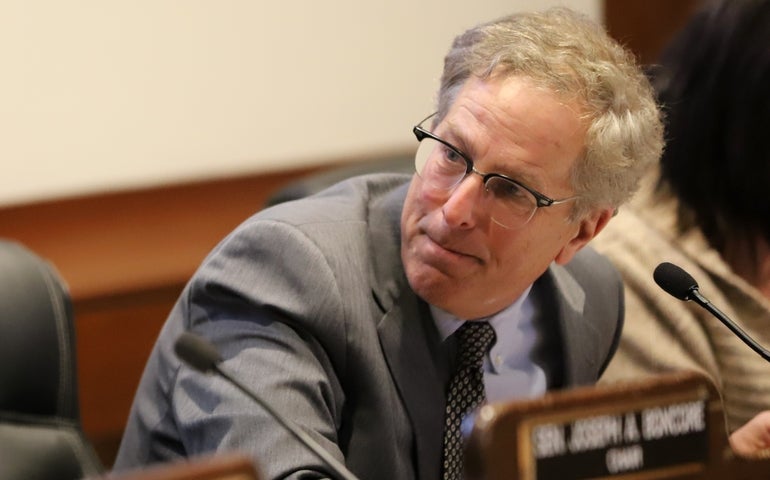A day after voting to raise taxes and fees by as much as $600 million per year, the Massachusetts House on Thursday overwhelmingly approved a roughly $18 billion bill authorizing spending on transportation projects and infrastructure over 10 years.
Before passing the bill on a 150-1 vote, the House without discussion or debate adopted a $2.4 billion mega-amendment, followed by a second $1.36 billion amendment. Both amendments stemmed from lengthy private talks, with the larger amendment authorizing, among other things, $350 million for improving roadway approaches to the two Cape Cod Canal bridges, which are both in need of either extensive repairs or replacement.
The larger amendment included more than 14 pages, single-spaced, of language earmarking spending to projects all over the state, with those earmarks subject to restrictions on annual state borrowing. The amendment also expanded the size of a rail improvement line item from $80 million to $400 million.
The House bulked up the bill’s bottom line to reflect the projected revenues approved on Wednesday, even though those taxes and fees face an uncertain future in the Senate and Gov. Charlie Baker opposes the House’s planned increases in gas and corporate taxes.
Baker has insisted that the state can afford his own $18 billion bond bill without new taxes, and that the House had left critical needs underfunded with its bill. House leaders reject the governor’s thinking, and say their spending is affordable only due to their passage of new revenues.
“The responsible and financially prudent thing is what the House is doing,” Transportation Committee Co-chairman Rep. William Straus said.
A huge chunk of the underlying bill, $5.6 billion, is for federal highway system projects, with $1.75 billion more carved out for the design, construction and repair of non-federally-aided roadway and bridge projects, and another $1.25 billion for construction, resurfacing, and improvements of bridges and approaches.
A $2.3 billion train system modernization initiative in the bill includes language requiring funds to be spent on implementing improvements tied to the Blue Line extension to Charles/MGH station, and for the design and construction of a commuter rail station at Wonderland Park on the Newburyport and Rockport line in Revere.
Other items in the bill authorize $825 million in spending in connection with expanding commuter rail service to the South Coast, $695 million toward the ongoing Green Line Extension project just north of Boston, and $400 million for South Station commuter rail improvements.
The House bond bill boosts Chapter 90 reimbursements to cities and towns for road repairs to $300 million, exceeding the governor’s bill by $100 million and fulfilling a request that municipal leaders have been making of the Legislature for years.
During a visit to the State House, North Adams Mayor Tom Bernard and Mount Washington Selectboard member Jim Lovejoy applauded the 50 percent increase in Chapter 90 funding but said they still need more financial support and a multi-year authorization.
Bernard said at the current funding levels, it would take 73 years to repave every road in North Adams. Mount Washington, according to Lovejoy, receives about $70,000 per year, according to the reimbursement formula, but faces costs of up to $1 million to repave a single mile of roadway.
“For most communities, it’s a lifeblood of funding for their municipal roads,” Lovejoy said.
Straus called Baker’s proposal to expand the use of grant anticipation notes, or borrowing against future federal grants, “dangerous” and one the House has rejected in its bill. The House proposal also excludes Baker’s ask for authorization to borrow against revenues that could come from the Transportation and Climate Initiative, a regional cap-and-trade program for emissions that the governor is still negotiating with other states.
“It’s a program that may have its day, we don’t know. But we can’t rely on it,” Straus said.
Rep. William “Smitty” Pignatelli was one of the few representatives who took the mic during Thursday’s recess-filled session, where most amendments were dispensed with following private talks. Pignatelli proposed revisiting the Chapter 90 funding formula, saying it needs to be made more equitable for small communities like his in the Berkshires.
Before withdrawing his amendment without a vote on it, Pignatelli suggested the House should reject the more than $4 billion in earmark spending amendments, boost Chapter 90 to $400 million and change the funding formula rather than continue to “beg, borrow and steal” to convince the governor to release money that will be authorized by the bond bill.
“Earmarks and bond bills are monopoly money until the governor says it’s real money,” Pignatelli said.
The House also rejected a Rep. Brad Hill amendment calling for a per-employee tax credit for companies that allow workers to telecommute, an idea that Baker touted in his bill.
A Rep. Carolyn Dykema amendment establishing MBTA office of transit parking and access survived scrutiny in the House and was adopted. The office would be charged with assessing parking capacity and demand near transit station, developing a plan to fund parking opportunities in areas of highest current and projected transit demand, and developing programs, which may include incentives, for private property owners to offer parking near high-demand stations.
The House also adopted a Rep. Shawn Dooley amendment requiring the MBTA to conduct a financial impact study on the feasibility of all platforms on commuter rail stops converting to fully raised platforms with handicap access at every train door. The study would be due by Dec. 31.
A $175 million item in the House bill authorizes spending on planning, design, permitting and engineering in connection with Springfield to Worcester rail service, Boston to Cape Cod service and Pittsfield to New York City service.
Senate Ways and Means Chairman Michael Rodrigues said Thursday he hoped the Senate would take up its version of the House bill before Senate budget debate, which usually occurs the week before Memorial Day weekend.

